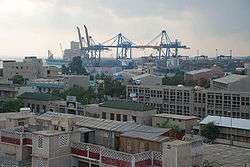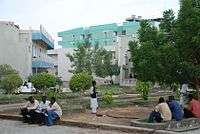Port Sudan
Port Sudan (Arabic: بور سودان Būr Sūdān) is a port city in eastern Sudan, and the capital of the state of Red Sea. As of 2007, it has 489,725 residents. Located on the Red Sea, it is the Republic of Sudan's main port city.
Port Sudan بور سودان | |
|---|---|
 Port Sudan Harbor | |
 Port Sudan Location in Sudan | |
| Coordinates: 19°37′N 37°13′E | |
| Country | |
| State | Red Sea State |
| Population (2007) | |
| • Total | 489,725 |
History
Port Sudan was built in 1905 to replace Suakin.[1] An oil pipeline was built between the port and Khartoum in 1977.
Economy
The city has an oil refinery and handles the majority of the country's international trade.[1] Major exports include oilseed, senna, and hides and skins. Imports include construction materials, heavy machinery, and vehicles.
Transport
The city has a modern container-port to handle imports and exports.[1] The main airport is Port Sudan New International Airport. There is now a tarred road linking Port Sudan to Khartoum via Atbara. Port Sudan also has a rail link with Khartoum. There is also an international ferry from Jeddah.
Education

The city is home to the Red Sea University, established in 1994.[2]
Places of worship
Among the places of worship, they are predominantly Muslim mosques.[3] There are also Christian churches and temples : Roman Catholic Archdiocese of Khartoum (Catholic Church), Sudan Interior Church (Baptist World Alliance), Presbyterian Church in Sudan (World Communion of Reformed Churches).
Climate
Port Sudan has a hot desert climate (Köppen: BWh) with extremely hot summers and moderately hot winters, requiring the acquisition of fresh water from Wadi Arba'at in the Red Sea Hills and from salt-evaporating pans. Temperatures can easily exceed 30 °C (86 °F) in winter and 45 °C (113 °F) in summer. Over 90% of the annual rainfall falls between October and January, mostly in November, with the wettest month on record being November 1947 with 182 millimetres (7.2 in), whilst the wettest year was from July 1923 to June 1924 with 231 millimetres (9.1 in). Average annual rainfall is 76 millimetres (3.0 in), and no rainfall occurred between January 1983 and June 1984.[4] The average temperature is 28.4 °C (83.1 °F).
| Climate data for Port Sudan, Sudan (1961–1990, extremes 1906–present) | |||||||||||||
|---|---|---|---|---|---|---|---|---|---|---|---|---|---|
| Month | Jan | Feb | Mar | Apr | May | Jun | Jul | Aug | Sep | Oct | Nov | Dec | Year |
| Record high °C (°F) | 37.0 (98.6) |
36.6 (97.9) |
40.0 (104.0) |
41.2 (106.2) |
47.0 (116.6) |
46.7 (116.1) |
48.0 (118.4) |
48.6 (119.5) |
46.1 (115.0) |
44.3 (111.7) |
39.0 (102.2) |
38.0 (100.4) |
48.6 (119.5) |
| Average high °C (°F) | 26.8 (80.2) |
27.0 (80.6) |
28.8 (83.8) |
31.4 (88.5) |
35.0 (95.0) |
38.5 (101.3) |
40.1 (104.2) |
40.2 (104.4) |
37.4 (99.3) |
33.4 (92.1) |
30.8 (87.4) |
28.8 (83.8) |
33.2 (91.8) |
| Daily mean °C (°F) | 23.3 (73.9) |
23.0 (73.4) |
24.3 (75.7) |
26.5 (79.7) |
29.3 (84.7) |
32.2 (90.0) |
34.1 (93.4) |
34.5 (94.1) |
32.1 (89.8) |
29.3 (84.7) |
27.3 (81.1) |
24.7 (76.5) |
28.4 (83.1) |
| Average low °C (°F) | 19.7 (67.5) |
19.0 (66.2) |
19.9 (67.8) |
21.6 (70.9) |
23.7 (74.7) |
25.9 (78.6) |
28.2 (82.8) |
28.9 (84.0) |
26.8 (80.2) |
25.3 (77.5) |
23.8 (74.8) |
21.3 (70.3) |
23.7 (74.7) |
| Record low °C (°F) | 10.0 (50.0) |
10.2 (50.4) |
10.0 (50.0) |
12.3 (54.1) |
17.4 (63.3) |
17.2 (63.0) |
20.0 (68.0) |
20.0 (68.0) |
18.9 (66.0) |
17.5 (63.5) |
17.5 (63.5) |
9.0 (48.2) |
9.0 (48.2) |
| Average rainfall mm (inches) | 7.2 (0.28) |
0.9 (0.04) |
0.9 (0.04) |
0.2 (0.01) |
1.1 (0.04) |
0.2 (0.01) |
3.8 (0.15) |
1.4 (0.06) |
0.0 (0.0) |
13.9 (0.55) |
35.0 (1.38) |
10.0 (0.39) |
76.1 (3.00) |
| Average rainy days (≥ 0.1 mm) | 1.2 | 0.2 | 0.2 | 0.3 | 0.3 | 0.1 | 0.8 | 0.3 | 0.0 | 1.2 | 4.1 | 1.7 | 10.4 |
| Average relative humidity (%) | 69 | 70 | 69 | 65 | 58 | 50 | 49 | 50 | 60 | 72 | 72 | 71 | 63 |
| Mean monthly sunshine hours | 195.3 | 226.8 | 282.1 | 306.0 | 322.4 | 285.0 | 272.8 | 288.3 | 282.0 | 297.6 | 225.0 | 213.9 | 3,197.2 |
| Mean daily sunshine hours | 6.3 | 8.1 | 9.1 | 10.2 | 10.4 | 9.5 | 8.8 | 9.3 | 9.4 | 9.6 | 7.5 | 6.9 | 8.8 |
| Percent possible sunshine | 57 | 68 | 75 | 80 | 80 | 72 | 67 | 68 | 78 | 82 | 69 | 63 | 72 |
| Source 1: NOAA,[5] Hong Kong Observatory,[6] | |||||||||||||
| Source 2: Meteo Climat (record highs and lows)[7] | |||||||||||||
Demographics
| Year | Population |
|---|---|
| 1906[8] | 4,289 |
| 1941 | 26,255 |
| 1973 | 132,632 |
| 1983 | 209,938 |
| 1993 | 305,385 |
| 2007 (est.) | 489,275 |
| 2008 (est.) | 517,338 |
The population consists mainly of Arabs, with small Asian and European minorities.[1]
Notable people
- Gawaher (Pop singer)
Notes
- "Port Sudan | Facts". Encyclopedia Britannica. Retrieved 2018-11-02.
- "Red Sea University". African Studies Center. Archived from the original on 2011-08-12. Retrieved 2011-09-17.
- Britannica, Sudan, britannica.com, USA, accessed on July 7, 2019
- Monthly Rainfall for Port Sudan (#62641)
- "Port Sudan Climate Normals 1961–1990". National Oceanic and Atmospheric Administration. Retrieved January 24, 2015.
- "Climatological Information for Port Sudan, Sudan". Hong Kong Observatory. Archived from the original on 2012-03-20. Retrieved 2015-10-28.
- "Station Port Soudan" (in French). Meteo Climat. Retrieved 22 October 2016.
- Chisholm, Hugh, ed. (1911). . Encyclopædia Britannica. 22 (11th ed.). Cambridge University Press. p. 133.
References
- Arckell, A. J., UNESCO General History of Africa, History of Darfur 1200-1700 A.D. SNR.
- Encyclopædia Britannica, "Port Sudan" (description), 2007, webpage: EB-PortSudan.
- Michael R. T. Dumper; Bruce E. Stanley, eds. (2008), "Port Sudan", Cities of the Middle East and North Africa, Santa Barbara, Cal.: ABC-CLIO, ISBN 9781576079195
External links
